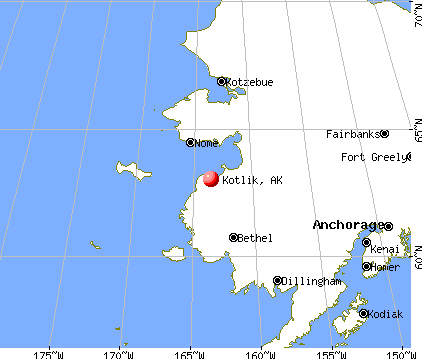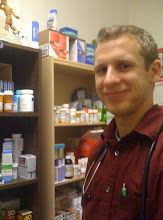Caprite
-- Yup'ik word, meaning "to be persistent when faced with difficulty."
-- Yup'ik word, meaning "to be persistent when faced with difficulty."
I spent the morning seeing pediatric patients with Beverly Burden, who had graciously taken me under her wing for the morning. I enjoyed working with kids and found them easy to provide for, as long as I wasn't about to inject them with something. The YK region (about the size of the state of Oregon) sees a lot of skin infections, primarily MRSA, and thus I'd seen plenty of mupirocin and hydrocortisone topical agents being prescribed. I was reviewing a chart when Beverly ran in.
"LifeMed's getting ready to fly," she said. "They're taking off in half an hour--if you're not there, they will leave you." I thanked her and darted to the pharmacy for my coat. LifeMed was essentially the YK ambulance for outside of Bethel. Should an outlying village need help, LifeMed was ready to dispatch its paramedics and transport the patient back to the hospital if needed. I raced over to my coat, threw it on, and explained hurriedly to the pharmacists where I was going. Soon I found myself in a taxicab on the way to the airport. I was unsure where the medical hangar was and thought for sure the experienced Bethel cab driver would know. However, he had no idea. After finding every hangar except the medical hangar (including the National Guard hangar) we stopped to ask the cargo flight crew where the med hanger was. I was sure I was going to miss the flight, but after asking the cargo crew, they pointed to the big white building next door. I gave my cab driver two vouchers and ran across the ice to the medical hangar.
The EMTs were getting ready and ushered me through the door. We made our hurried introductions as we jumped on to a Cessna 280. There was Mark and Mariso, the EMTs, and Taka, the pilot. The plane was loaded with the usual emergency equipment, stretchers, hypothermia gear, etc.
"We can do basically anything in the field," Mariso explained to me. "We're given a great deal of liberty since we might be hours away." He showed me their pharmaceutic pack. It was filled with drugs from nearly every class. Since it might be hours (or days, if they were delayed by weather) before the patient would see the hospital, they were equipped to stabilize and begin managing nearly every medical emergency. I asked where we'd be going.
 "Kotlik," he said. He handed me a copy of the flight plan. Kotlik was a small village on the Yukon River with thirty to fifty buildings, a small airstrip, and not much else, up in the very Northern corner of the area YK served. It was about 154 nautical miles from Bethel.
"Kotlik," he said. He handed me a copy of the flight plan. Kotlik was a small village on the Yukon River with thirty to fifty buildings, a small airstrip, and not much else, up in the very Northern corner of the area YK served. It was about 154 nautical miles from Bethel.We took off and flew at approximately 4,200 ft, traveling at about 160 knots. The trip took about an hour. Underneath us, I watched the barren Alaskan tundra roll by. Not a tree, shrub, or moose speckled the perfectly snow-painted ground. Tiny frozen rivers weaved in an out, flowing to and from the small lakes. Presently we passed over sparse forests and I wondered when the last time, if ever, that a human had walked on the land beneath me. I was now further North than I had ever been before in my entire life.
We arrived in Kotlik and loaded up a handmade dog sled with gear, climbed on, and rode into the village, powered not by canine mechanism, but by snow-machine. It pulled us over the small ridges and around corners fast enough to make the 18 degree temperature feel much more like -20. I braced down the equipment. "You'll have to tell your pharmacy buddies about this one," Mark said, riding on the back of the sled, where the musher would. "I bet they all wouldn't do this." We hit a large bump, sending myself and the gear a foot into the air. I landed hard back down on the wooden sled. I pictured some of my fellow students doing this and figured Mark was probably right.
We past several dozen small buildings, each supported above the permafrost on pillars just like in Bethel. But where the buildings in Bethel were relatively well maintained, there were several buildings in Kotlik in desperate need of repair. Aluminum siding was braced against the sides of many buildings, not unlike some of the village housing I'd seen while in Fiji. Snow covered everything. A husky gave us a few welcome barks from on top of a large stump. Several people were walking around, looking toward us as we passed by, our nylon parkas, brightly colored bags, and sense of urgency contrasting greatly with the environment around us.
On arrival, we stabilized the patient and began our return to the airport. The people of Kotlik were kind. The kids were listening to iPods. I would have liked to explore more, but we were obviously not there to sight-see. I jumped up in the co-pilots seat for the flight back. The sun penetrated the windshield easily. The sky was perfectly clear, making it easy to the ground. I wished I had my favorite sunglasses, since I spent the hour and a half-flight back squinting.
I imagined myself in a different situation--as the patient in a village who had to have the village call the EMS after an accident. I would wait for hours before they arrived. The weather, unlike today, wouldn't be the ideal, perfect visibility conditions, but one of the frequent torrential blizzards, which would delay the return to the hospital. The pilot, constantly having a plan B, or C, would turn the plane around to a safe place to land, but the EMTs would have only so many resources available to them. For some people, this is a very real situation.
Then why live out here? Why live in the middle of nowhere, without running water, away from help, where one must trap, attempt to farm, and fish to guarantee survival. The answer I obvious to the people who do this. They do it because that is who they are, and that is how it has been done. This kind of continuous survival has instilled a kind of genuineness that is so easily lost with convenience. It is something to learn from, and during my last bit of time here, I plan to soak it in as much as I can.





Hello -
ReplyDeleteWelcome to Alaska!! I am happy to have the chance to read about your adventures.
Are they really farming in Kotlik??
Be well and take care of yourself!!
I should have been more specific...it looked as if someone had a large animal pen...which appeared empty at the time. Maybe it has another function?
ReplyDeleteI am enjoying your posts and noticed your reference to CNN - here are a few articles I wrote about Rural Alaska that relate to their story -
ReplyDeletehttp://www.indiancountrytoday.com/living/education/31128284.html
http://www.indiancountrytoday.com/national/36747189.html
http://www.indiancountrytoday.com/national/hawaiialaska/38665642.html
I am in Anchorage - but you, my friend, are truly in ALASKA!!